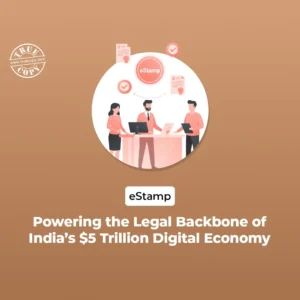Gone are the days when executing legal documents meant enduring the tedious process of purchasing physical stamp papers. Remember wasting hours standing in queues at government offices or authorized vendors? The constant anxiety about receiving counterfeit stamps? The messy paperwork that needed careful preservation? All these frustrations have become a thing of the past with the advent of digital stamping in India. This revolutionary, government-backed solution offers a remarkably faster, completely secure, and legally recognized alternative for paying stamp duty. But how exactly does this modern system function? What makes it different from traditional methods? And most importantly, can you trust its legal validity? Let’s explore these questions in straightforward, easy-to-understand language that cuts through the legal jargon.
Is Digital Stamping Legal in India?
Absolutely! The government introduced digital stamping (also called e-stamping) to make the eStamping process in India more secure and convenient. Authorized agencies like the Stock Holding Corporation of India Limited (SHCIL) issue digital stamps, that hold the same legal value as traditional stamp papers.
No more worrying about counterfeit stamps—every digital stamp comes with a unique eStamp certificate India that can be verified online.
What is Stamp Duty?
Stamp duty is a tax paid to the government when executing legal documents like property agreements, affidavits, or contracts. Earlier, you had to buy physical stamp papers, but now, you can pay for online stamp paper India and get a digital stamp instantly.
This shift not only saves time but also reduces fraud and paperwork.
Why Choose Digital Stamping Over Physical Stamps?
Here’s why more people are switching to eStamping India:
✔ No Fake Stamps – India digital stamps are secure and verifiable, unlike paper stamps that can be forged.
✔ Instant & Convenient – Get your stamp certificate online in minutes—no more standing in queues.
✔ Easy to Verify – Every digital stamp has a unique ID that can be checked online for authenticity.
✔ Eco-Friendly – No paper waste, making it a greener option.
✔ Works Anywhere – Complete the process from home or office, without visiting a stamp vendor.
Some platforms even allow you to add digital signatures, making the entire process paperless.
Where Can You Use Digital Stamping?
Digital stamps are accepted for most legal documents, including:
- Rental agreements
- Property sale deeds
- Affidavits
- Power of attorney
- Loan agreements
- Business contracts
Instead of handling physical papers, you can now complete these transactions online with just a few clicks.
How Digital Stamping Works with eSignatures
Digital stamping and eSignatures together create a seamless, end-to-end paperless workflow for legal documents in India. Here’s how it works:
- Generate a digital stamp: First, generate a digital stamp online through government-approved platforms—this replaces the traditional stamp paper. The E-stamping system instantly issues a secure, tamper-proof eStamp certificate with a unique identification number.
- Sign the document electronically: Next, electronically sign the document using a legally valid eSignature (as per India’s IT Act, 2000). Many platforms allow different types of eSignatures, including Aadhaar-based OTP signing and digital certificates from licensed providers.
- Store it securely online: Finally, the stamped and signed document gets securely stored in digital format—either on the platform’s cloud storage or your system. This eliminates the need for physical printing, scanning, or manual filing.
The entire process—from stamp payment to signing—takes just minutes. Best of all, courts and government offices across India recognize these digitally stamped and signed documents as fully valid, making them perfect for agreements, contracts, affidavits, and property deals.
Frequently Asked Questions (FAQ)
Yes, under the IT Act, 2000, digital signatures are just as valid as handwritten ones.
E-stamps are digital, instant, and secure, while traditional stamps require physical paper and are prone to forgery.
Most states accept it, but some may have specific rules—always check local regulations.
Government-approved agencies like SHCIL are authorized to issue them.
Property deals, rental agreements, affidavits, and legal contracts usually need stamp duty.
Yes! Many platforms support both, making the entire process digital.
Each stamp has a unique ID that can be verified on the issuing authority’s website.
Summing up
Digital stamping is changing the way India handles legal documents, making the process faster, safer, and hassle-free. No more running around for stamp papers or worrying about fraud.
With instant issuance, easy verification, and the option to add eSignatures, it’s the smart choice for anyone dealing with agreements, contracts, or property documents.
Ready to go paperless? Try digital stamping supported by TRUESigner ONE today!



